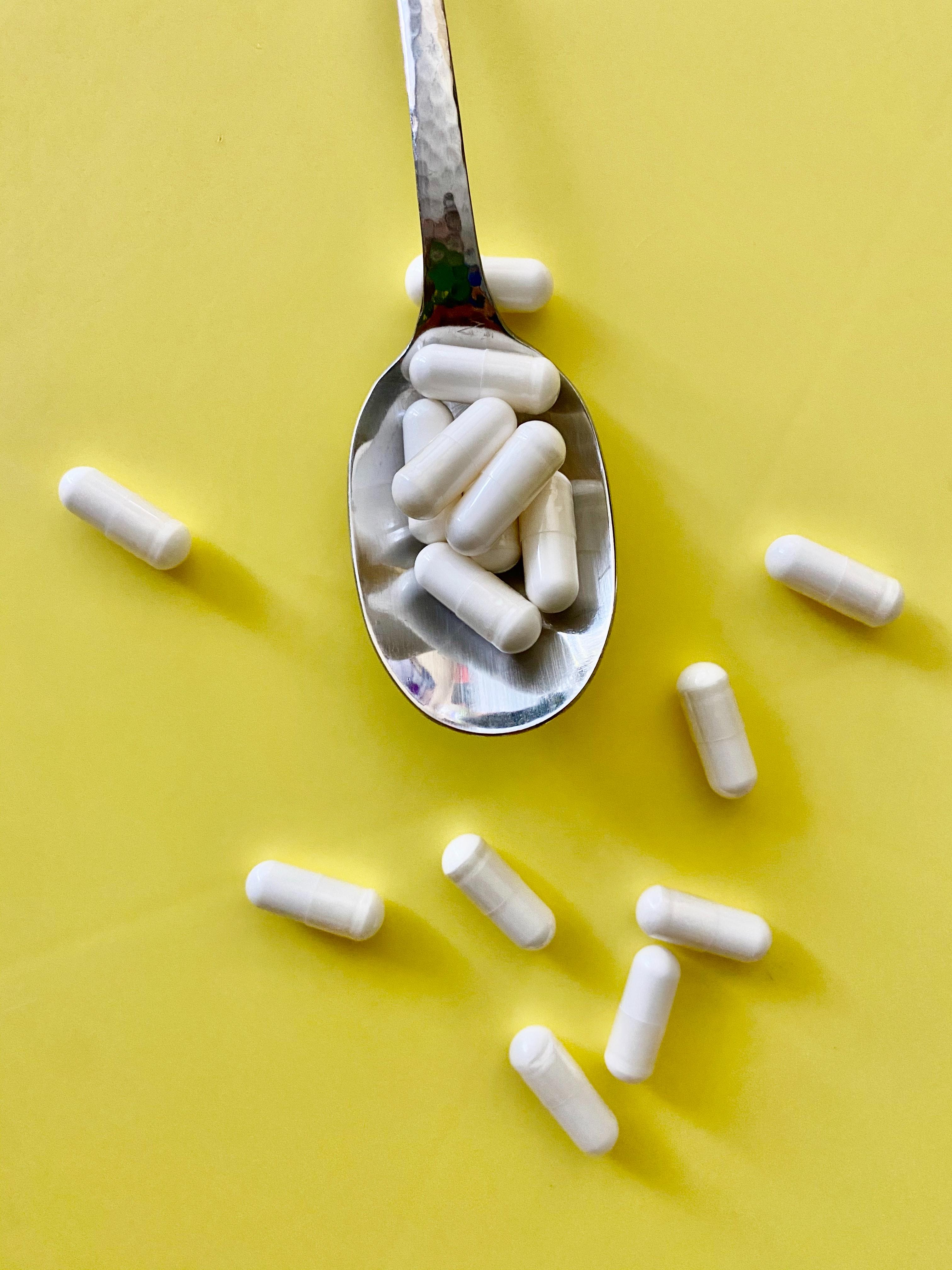Inositol is a carbohydrate that exists naturally in your body and in certain foods. A growing body of evidence suggests that it offers some stellar health benefits. Women with PCOS praise inositol for aiding them with this condition. However, it can also exert other positive influences on the body and help with a variety of symptoms. In this article, we’ll break down everything that you need to know about inositol.
- Inositol may improve fertility in women with PCOS through enhanced ovulation and hormonal balance.
- It can boost insulin sensitivity, potentially aiding those with metabolic syndrome and gestational diabetes.
- Research suggests inositol might benefit mental health by influencing serotonin and dopamine levels.
What is inositol?
Inositol was originally found in muscle cells back in 1850 (1). Although it is chemically similar to glucose, it is not a carbohydrate. Also, despite being commonly called “vitamin B8”, it is not actually a vitamin. So… what is it?
Inositol is not technically a nutrient because humans can synthesize it. However, since it exerts numerous effects on the body, it is now sold as a dietary supplement. It has been shown to influence metabolism, hormones, free radical response, and more. In addition to existing within humans and supplement bottles, inositol is also found in foods such as beans and fruits.
Inositol has nine stereoisomers, which are different compounds that have the same molecular formula. Of the stereoisomers, myo-inositol (MI) is the most common. While a few of the other forms of inositol might play important roles in our systems, most interest has centered around D-chiro-inositol, inositol hexaphosphate (IP6) and MI (2).
What are the potential benefits of inositol?
PCOS
Polycystic ovary syndrome (PCOS) occurs when a woman produces abnormally high amounts of certain hormones, particularly androgens. While there is no single test for a definitive diagnosis, most doctors will screen for a cluster of signs and symptoms such as irregular menstrual cycles, weight changes, excess hair growth, insulin resistance, and acne (3). A doctor might then confirm by performing a pelvic exam, blood tests, and/or ultrasound.
Women with PCOS often experience fertility issues, possibly related to hormonal abnormalities and insulin resistance. Many women who suffer from PCOS supplement with inositol to improve fertility, and there is some convincing research to support this. A review of twelve randomized controlled trials found that oral supplementation of MI alone or in combination with D-chiro-inositol restored spontaneous ovulation and improved fertility in women with PCOS (4).
While it is exciting that inositol can benefit women with PCOS, it is also important to individualize treatment (a common theme with everything nutrition-related). One review found that many inositol-based treatments for PCOS are actually flawed (5). The authors’ argue that many protocols are chosen at random and tend to combine inositol with ineffective or possibly counterproductive molecules. This might weaken the efficacy of treatment. This is why we always emphasize working with a health professional before starting any dietary supplement to ensure your protocol is optimal.
Insulin Resistance
The pancreas produces a hormone called insulin that controls the amount of glucose in the blood by allowing the body to absorb it into liver, fat and muscle cells. Insulin resistance occurs when these cells have a weakened response to insulin (6). Consequently, the pancreas produces more insulin while blood glucose levels rise. Insulin is closely related to obesity, type 2 diabetes, and many other health conditions.
Inositol has been shown to play a role in insulin action within the body, and thus has been theorized to improve insulin sensitivity (7). It has been studied both in the context of various conditions including PCOS (as mentioned above), gestational diabetes, and metabolic syndrome.
Metabolic syndrome is a cluster of conditions that increase risk of cardiovascular disease, stroke, and diabetes. A person is diagnosed with metabolic syndrome if he or she meets at least three of the following criteria (8):
- Central obesity (measured by waist circumference)
- Elevated triglycerides
- Sub-optimal HDL cholesterol (“good” cholesterol)
- Increased blood pressure
- High fasting glucose
One randomized, place-controlled study found that women with metabolic syndrome who supplemented with MI saw improvements in insulin sensitivity (9).
Gestational diabetes is when high blood sugar and/or altered insulin response occurs for the first time during pregnancy. A review of the potential role for inositol in the prevention of gestational diabetes found that supplementing with MI might reduce the risk of gestational diabetes (10). This implies that it exerts a beneficial effect on insulin response. Furthermore, a study conducted on women already with gestational diabetes found that MI improved insulin resistance (11).
Thyroid Health
The thyroid is a gland that acts as the body’s master regulator of metabolism. It produces hormones that regulate the chemical processes involved in breaking down calories for energy. They have an effect on heart beat, breathing, weight gain or loss, body temperature, cholesterol, menstrual cycles, and more (12).
Studies show that inositol is related to thyroid function, and it has promising therapeutic potential. A review that analyzed inositol’s role in thyroid health found that inositol may benefit people who suffer from thyroid diseases, particularly women (13). The authors concluded that part of the benefit stems from improvements in insulin resistance. They also acknowledge limitations on studies regarding inositol and male thyroid health. However, supplementation may also benefit men due to the insulin response factor.
Mental Illness
It is no surprise that mental illness is a growing health issue worldwide. Many mental illnesses involve imbalances in serotonin and dopamine. Meanwhile, studies have shown that people who suffer from certain mental illnesses have lower levels of inositol in their brain (14).
This connection has led to inositol being studied as a potential treatment for a variety of mental illnesses. Controlled trials have shown that inositol has therapeutic effects on these important brain chemicals (15). This can benefit treatment for depression, panic disorders, and OCD. Nonetheless, research has not been entirely consistent. For example, some studies show that inositol supplementation improved symptoms in people with depression and anxiety, while others did not suggest any significant benefits (16).
It’s important to note that many studies looking at inositol as a treatment for psychiatric disorders involve high-dose supplementation. Two studies that looked at patients with panic disorders both found that inositol helped reduce the frequency and severity of panic attacks (17, 18). However, the participants supplemented with 12-18 grams of inositol per day.
Other Potential Benefits
- Male Fertility and Erectile Dysfunction: While most research has been conducted on female patients, inositol might be beneficial to men particularly as it relates to their fertility and erectile function. One review found that MI might be an effective treatment for male infertility by acting as an antioxidant, pro-kinetic, and hormone regulator (19). Another study conducted on men with type 2 diabetes saw improved erectile dysfunction with supplementation of inositol (20). However, the subjects also supplemented with folic acid, so it’s possible that there is a synergistic effect.
- Anti-Cancer: Both IP6 and MI have been studied for their potential cancer-fighting properties. A review found that IP6’s anticancer action has been consistent and reproducible (21). This is likely related to the compound’s ability to reduce cell proliferation (unwanted reproduction and spreading), induce cell apoptosis (cell death) and differentiate malignant cells (cancer-causing cells). The review also noted that some reports have shown that patients receiving IP6 experienced reduced severity of chemotherapy side-effects.
How should you take inositol?
First of all, we want to highlight that you don’t necessarily have to buy a dietary supplement in order to ingest inositol. As mentioned above, the compound occurs naturally in a variety of foods.
MI is found in meat and seafood, fruit, vegetables, dairy, dried prunes, and grains (22). Researchers have found that MI is higher in fresh fruits and vegetables as opposed to frozen, canned, or salt-free products. However, diet alone may provide 225 to 1500 mg/day of MI, which is a wide range.
D-chiro-inositol is another common form of inositol supplements, particularly those marketed as antioxidants and for PCOS. It has been extracted from buckwheat and a type of squash known as “figleaf gourd” (23, 24).
Since “figleaf gourd” likely is not part of your regular diet, and there’s some compelling evidence to show that supplementing with inositol can be beneficial, let’s talk about how to go about that. The most common form of the supplement is an unflavored powder. You can mix it with water, milk, juice, or other beverage. Some people might stir it into oatmeal or yogurt. It’s quite tasteless and dissolves easily.
The typical dose of MI is 2-4 grams per day. Some supplements that contain D-chiro-inositol provide the isomer in a 1:40 ratio with MI, which is considered to be the body’s optimal ratio (25).
There is some evidence that softgels are absorbed better than powders, and therefore only needs about one-third of the dosage in order to garner similar results (26). However, powers are more common than softgels.
Is it safe to supplement with inositol?
Inositol has been shown to be safe to supplement with both in pregnant and non-pregnant populations (27, 28). One review found that high doses of MI (12g/day) caused some mild GI side effects including nausea, gas and diarrhea. However, most people supplement with a much smaller dose.
It’s important to highlight that there are certain conditions where supplementing with inositol might be harmful. These include end-stage kidney disease, bipolar disorder, and ADHD (29, 30). As always, please consult with a healthcare professional before taking any new dietary supplements.
What’s the bottom line?
Inositol is clearly very promising, and its potential benefits extend towards a huge variety of conditions. There is research supporting its use as a therapeutic agent in people with PCOS, insulin resistance, thyroid disease, mental illness. It also might have the ability to aid male infertility and erectile dysfunction, act as a cancer preventative agent, and mitigate the harsh side effects of chemotherapy. While it naturally exists in the body, the evidence is compelling to believe that ingesting more could be helpful. While diet alone can provide up to about 1.5 grams of MI, most protocols suggest supplementing with 2-4 grams of MI per day and/or about 100mg of D-chiro-inositol. Supplementing with inositol is likely safe for most healthy people, but there are some conditions that warrant caution. As always, speak to a health professional before taking any dietary supplements.
Any general advice posted on our blog, website, or application is intended for reference and educational purposes only and is not intended to replace or substitute for any professional medical advice, diagnosis, treatment, or other professional advice. If you have specific concerns or a situation arises in which you require medical advice, you should consult with an appropriately qualified and licensed medical services provider.






